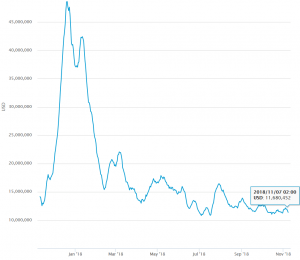Huobi Opens “Mining Hotel” in Russia amid Mining Uncertainty
Cryptocurrency exchange Huobi is to open a Russian office on Monday November 12, and will offer customers “mining hotel” services – although a recent report claims Russian mining fever may well be on the wane.

The concept of mining hotels involves a system whereby cryptocurrency miners can have their rigs housed and monitored, paying only rent and electricity costs.
However, Russia’s Newsroom24 claims that people in the country may be losing their appetite for mining. The media outlet states that stores in Nizhny Novgorod, a city that has become a hub of crypto-mining activity in recent months, are now fully stocked with mining hardware that was once flying off the shelves at breathtaking speeds.
The media outlet also states that mining farm facilities are disappearing from the market, while at the height of the mining boom, farms were changing hands for prices of over USD 100,000.
Newsroom24 states that the market has been dampened by the Central Bank’s anti-cryptocurrency rhetoric, as well as falling cryptocurrency prices.
Huobi Russia is also planning an ambitious accelerator program for blockchain startups, as well as an educational course created in conjunction with the prestigious Moscow-based Plekhanov Russian University of Economics.
Per Forklog, Senior Director of Huobi Global Edward Chen joined the head of Huobi Russia, Andrey Grachev, at a blockchain event in St Petersburg this week to confirm the news.
Forklog quotes Huobi Russia as stating, “Participants will learn about digital asset management and the automated and Huobi’s algorithmic trading services. Russians will be able to learn more about about blockchain technology and about cryptocurrencies in particular.”
Huobi is pursuing a seemingly relentless policy of global expansion, and is now said to be targeting Africa and the Middle East, after recently setting up shop in notably crypto-keen nations such as South Korea. The company is now Singapore-based, but prior to the Chinese crypto crackdown of September 2017, it operated the biggest-trading exchange in the world in Beijing.
And Huobi has been looking to get more involved in the Russian fintech scene in the past few months, launching a Russian-language website last month. In September, it announced it was teaming up with state-owned bank Vnesheconombank’s VEB Innovation Fund, where it also vowed to share its cryptocurrency-related expertise.
_____
Miners Revenue
Total value of block rewards and transaction fees paid to miners (7 day average).





